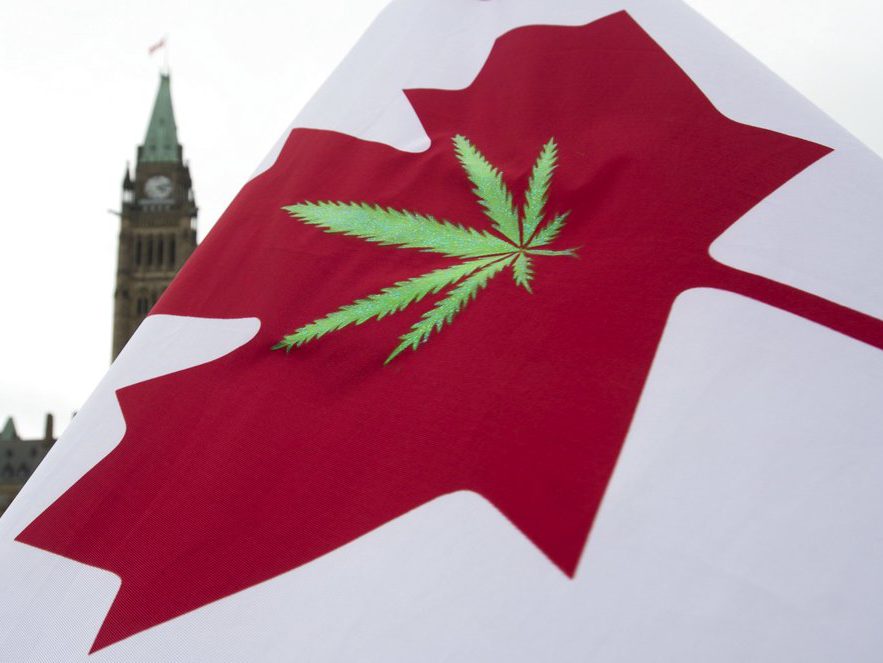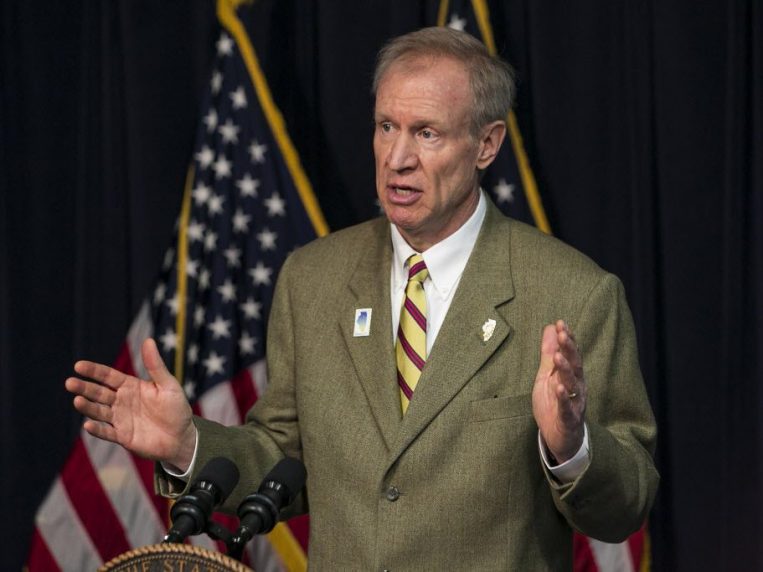POT TOPICS is a weekly collection of cannabis-related news curated by the Chicago Sun-Times. Here are this week’s top stories from Chicago and around the country:
- Democratic state senator urges Governor Rauner to sign “Ashley’s Law,” one of three cannabis-related bills that have recently been sent to his desk;
- Canadian pot company becomes first to complete an initial public offering in the U.S.;
- Republican running for Tennessee governor uses Trump campaign footage in pro-medical cannabis campaign spot;
- Pennsylvania pot legalization could create $500 million in tax revenue;
- Ohio Congressman endorses pot legalization in all 50 states; and
- Editorial: Plummeting pot arrests good for the city
Rauner draws heat from Democrat as he considers cannabis-related bills and “Ashley’s Law”
State Sen. Cristina Castro, D-Elgin, is pressing Gov. Bruce Rauner Monday to sign a bill she co-sponsored that would allow students to use medical cannabis at Illinois schools.
Rauner is currently considering a handful of cannabis-related bills, the most pressing of which is Castro’s legislation. The governor has less than a month to take action on the bill, which was sent to his desk on June 15.
“I am shocked that the governor hasn’t signed this bill,” Castro said this week. “If we want qualified students to live as normal of a life as possible, we need to allow them to have access to their medications at all times.”
In February, state Rep. Lou Lang, D-Skokie, introduced “Ashley’s Law,” which quickly garnered bipartisan support in the Legislature. The measure passed the House in April in a 99-1 vote and was approved by the Senate the following month in a 50-2 vote.
The bill was named for 12-year-old Ashley Surin, who uses cannabis to treat epileptic seizures related to a Leukemia diagnosis. In January, Ashley’s parents filed a federal lawsuit against the state of Illinois and Schaumburg School District 54 after Ashley was barred from class for medicating with the drug. A federal judge ultimately ruled in favor of the family in April.
Ashley’s mother, Maureen Surin, remains hopeful that Rauner will sign the measure into law.
“All children in the state of Illinois dependent on medical marijuana have a right to an education,” said Surin, who noted that Ashley is doing “awesome” and will be starting junior high in a month.
“Let the 25-day countdown to the ‘Ashley’s Law’ celebration begin,” she added.
In addition to “Ashley’s Law,” Rauner is also considering bills that would legalize industrialized hemp and offer medical pot as an opioid replacement. Those bills also received strong bipartisan support in Springfield.
Nevertheless, the governor’s office wouldn’t comment on the pending legislation.
“The Legislature has sent about 600 bills to the Governor’s desk,” Rauner spokeswoman Beth Tomev said in an email Friday. “We’re reviewing them and will comment at the appropriate time.”

chicago.suntimes.com
Canadian company raises $150M with first U.S. pot IPO
On Thursday, British Columbia-based Tilray Inc. became the first pot business to complete an initial public offering on a major U.S. stock exchange, raising $153 million as Canada prepares to legalize the drug nationwide in October.
At the start of the day, Tilray Inc. began trading on the Nasdaq exchange at $17 a share, but the stock quickly jumped by more than $4. Although Tilray isn’t the first cannabis company to trade on a major American stock exchange, it’s the first to use an IPO.
John Kagia, an analyst with the marijuana market research firm New Frontier Data, said the move could bolster Tilray’s credibility and confidence within the weed industry.
“It’s another high-profile marker of how the cannabis industry is maturing and professionalizing,” Kagia said.
Tennessee gubernatorial candidate features Trump in pro-pot campaign ad
A Republican running for Tennessee governor released a pro-medical marijuana campaign ad Friday that features a clip of President Donald Trump.
In the 30-second spot, Beth Harwell, the state’s current house speaker, claims she’s the “only Republican candidate who supports legalizing doctor-prescribed medical cannabis.”
“Many suffer,” she says. “Veterans, children with seizures, cancer patients, our elderly. I just know if it were my loved one, I would want this option.”
“President Trump agrees,” she continues.
The ad then jumps to a clip of Trump from an October 2015 campaign rally.
“I think medical should happen, right?” Trump asks. “Don’t we agree?”
Harwell goes on to say that opioid painkillers “must not be our only option for those in pain.”
The Republican came out in support of medical cannabis earlier this year after revealing that the drug helped her sister deal with a back injury, according to the Tennessean.
Harwell-backed medical marijuana legislation was introduced in the Tennessee Legislature earlier this year, but the bill didn’t make it to a floor vote in either house.
Pot legalization in Pennsylvania could create $500M tax windfall
Pennsylvania Auditor General Eugene DePasquale, the state’s elected fiscal watchdog, released an analysis Thursday claiming the legalization and taxation of pot at 35 percent could add more than $500 million in tax revenue.
Pasquale, a Democrat, noted that there are roughly 800,000 regular marijuana users in Pennsylvania, which legalized medical pot in 2016.
He estimated that the retail market could be about $1.7 billion, based on studies from other states that show adult users typically spend about $2,100 on the drug every year.
Ohio Congressman: Legalize pot in all 50 states
Rep. Tim Ryan (D-OH) penned an op-ed this week calling for the legalization of cannabis in all 50 states.
According to the piece, published Friday by CNN, more people were arrested for pot possession in 2016 than for all violent crimes combined. What’s more, the ACLU found that black Americans are four times as likely to get arrested for marijuana possession than whites.
Ryan noted that he was initially “hesitant” to support marijuana legalization efforts as co-chair of the House Addiction, Treatment and Recovery Caucus. But after meeting with Ohioans affected by pot arrests, he found the social and economic injustices of pot policy were “too big to ignore.”
“I firmly believe no person should be sentenced to a lifetime of hardship because of a marijuana arrest,” Ryan wrote. “It is morally wrong and economically nonsensical.”
The Democrat pointed to studies that estimate legalization could add nearly $14 billion in net savings — $7.7 billion from averted enforcement costs and $6 billion from added tax revenue. In addition, legalization would reportedly add 782,000 jobs, he said.
Ryan urged fellow congressmen to pass the Marijuana Justice Act, which would remove marijuana’s designation as a dangerous Schedule I drug.
“The War on Drugs failed the American people,” he wrote. “It is time for us to take the necessary steps to right out nation’s wrongs. We cannot leave people behind and money on the table.”
Sun-Times EDITORIAL: Plummeting marijuana arrests amount to good news for Chicago
Following Frank Main’s recent Sun-Times cover story about the dwindling number of marijuana arrests in Chicago, the paper’s editorial board lauded the city’s revamped policy for handling minor pot offenses while noting that African-Americans account for the vast majority of Chicago’s petty pot arrests.
“On the upside, our courts are a little less clogged. The county jail is less crowded. Our police can devote more time and energy to more serious problems. A more enlightened legal approach to marijuana has contributed to a more sensitive approach to the opioid epidemic,” the editorial board wrote. “And support is growing for a permanent statewide medical marijuana program.”
But African-Americans are still being arrested for minor pot offenses at a much higher rate than other Chicagoans. In 2017 and the first four months of 2018, 94 people were arrested in Chicago for petty marijuana offenses, down from 21,000 in 2011. However, 76 of those people were black, while 16 were Hispanic and only two were white.
Chicago Police Supt. Eddie Johnson has blamed open-air drug markets on the city’s South and West sides for the disproportionate number of arrests.
“As long as the police make any arrests at all for petty pot offenses, that racial disparity shouldn’t sit easy with anybody,” the editorial board wrote. “But there’s no denying we’ve arrived at a better day.”
Upcoming cannabis events in the Chicago area:
• The Midwest Compassion Center holds its monthly patient social at 2 p.m. July 22 at 721 N. Independence Blvd. in Romeoville. Experts will answer questions and offer application assistance to prospective medical cannabis patients.
• The 420 Cannabis Social is set to take place at 11 a.m. July 29 at Cricket Hill near the intersection of Montrose Avenue and Lake Shore Drive. Attendees will discuss cannabis legalization, medicinal cannabis use and the drug’s health benefits.
Credit: chicago.suntimes.com


